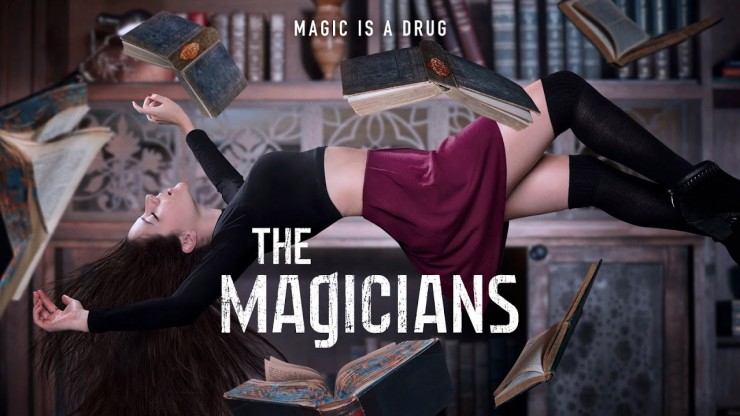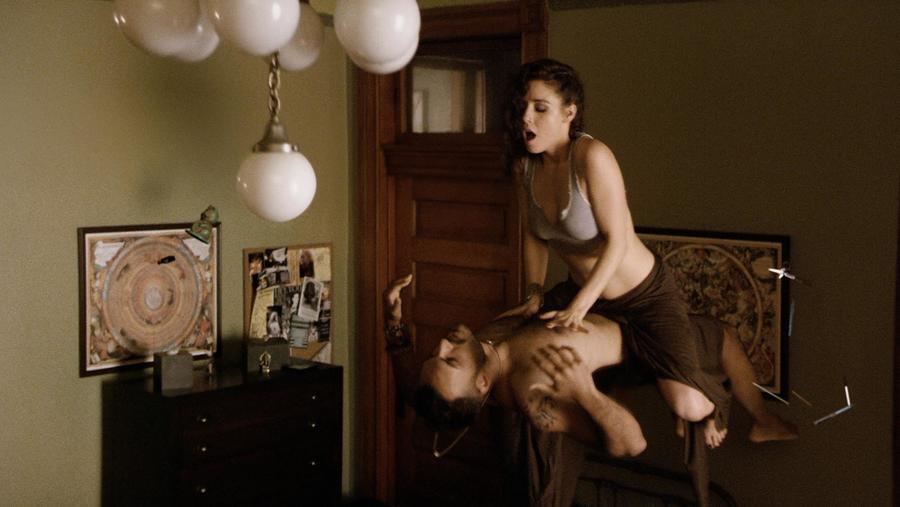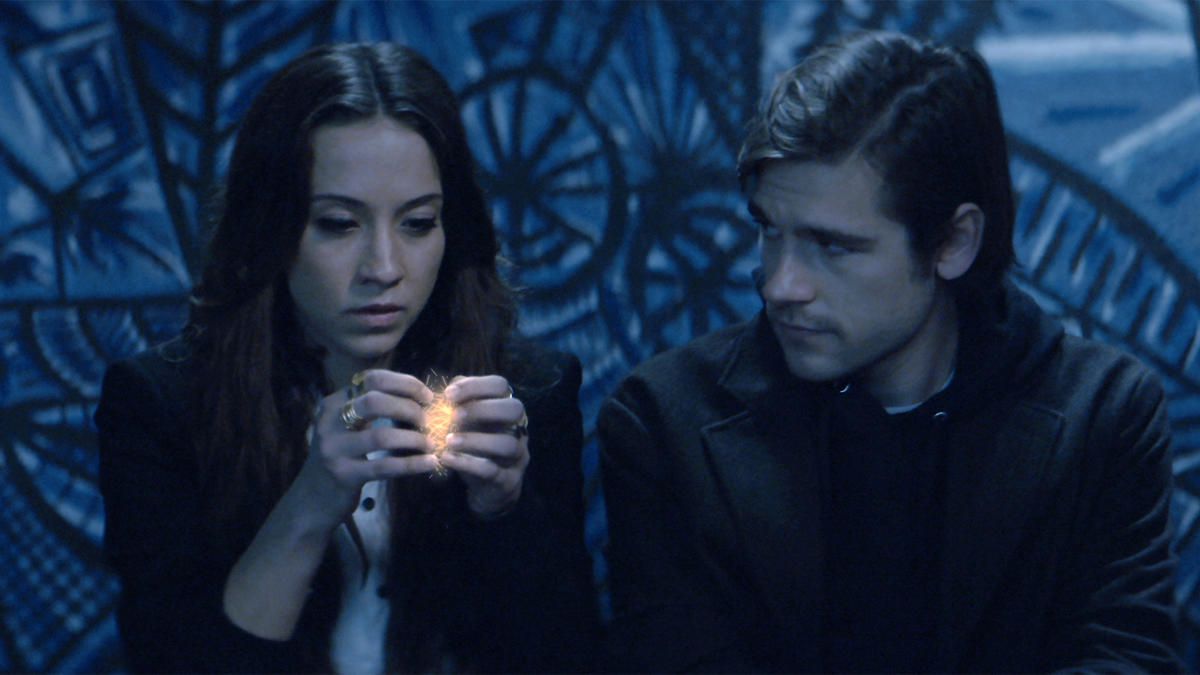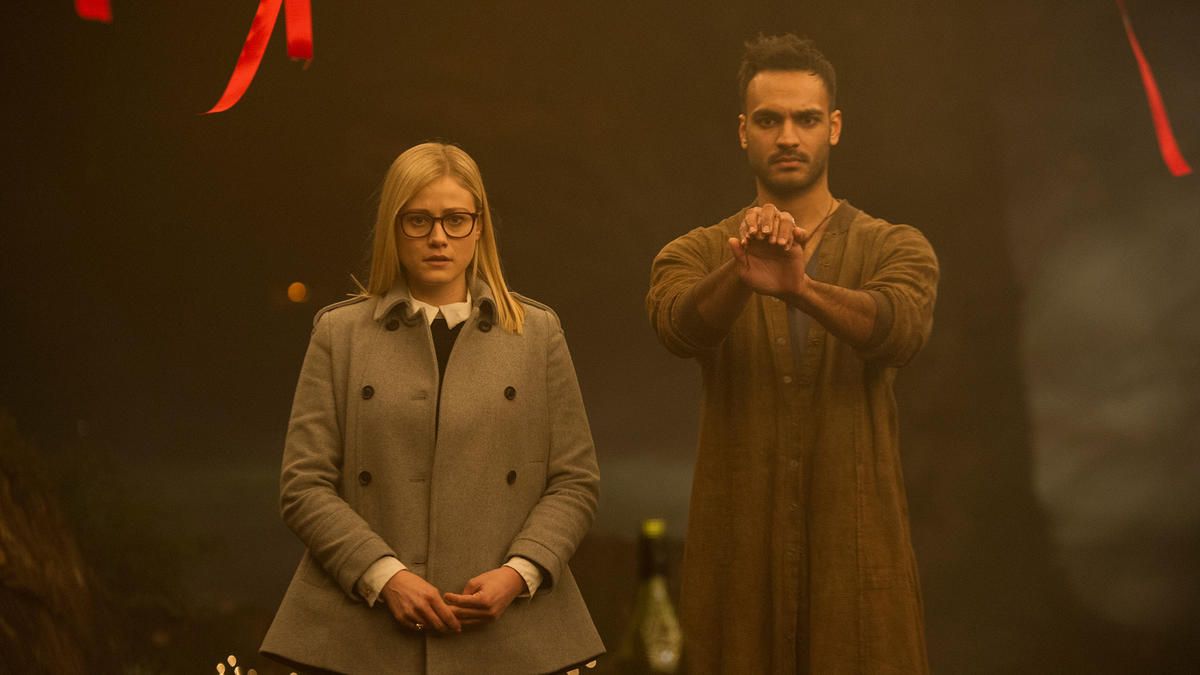Okay, I’ve got a story for you. Imagine, if you will, a
young man named Quentin Coldwater who discovers that he has been accepted to study
magic at a mysterious school and join the ranks of the world’s magicians, those
who can work actual magic. Along the way, Quentin and his friends begin to
discover that a beloved series of children’s books about adorable English
orphans who escape to a magical land may, in fact, be based on reality. Of
course, nothing is as it seems and while our heroes learn more about their
powers, they become aware that a dark and powerful force is watching and coming
for them.
I know, right? Can totally see where all this is going. The
premise will sound achingly familiar to anyone who has even glanced in the
direction of the fantasy section at Barnes & Noble. Nonetheless, SyFy’s The Magicians, based on the series of
books of the same name by Lev Grossman, has finished its first season. And,
actually? It’s pretty good.
 |
| Accio Preppy Girl! |
What makes The
Magicians’ story more interesting than what you might expect is that it
actually does a fair job avoiding the well-worn tropes of fantasy. Some things
remain, of course. There’s still an overly-powerful villain bent on doing bad
things; the merry band of adventurers must still come together to save the
land; there are, natch, talking animals. But where both the books and TV series
succeed is in striking out on some new ground.
Unlike most fantasy stories, Quentin is not a chosen one. The books go
out of their way to explain that there are no prophesies, no special destinies
to be fulfilled. In fact, anyone can
do magic if they are smart enough, focused enough, and possess some latent
skill for it. Add to this that Quentin’s fellow students are far from the
precocious mainstays that seem to pass through Hogwarts. They’re loud, drunk,
hedonistic, complicated, a little giddy about how cool it is that they can do
magic. When the books were published they were somewhat derisively referred to
as “hipster Harry Potter”, which wasn’t altogether unfair.
All that gritty real life is on full display in the show.
Brakebills University is the college to Hogwarts’ primary and secondary school
and as such, the characters are that much older and more adult-acting. There’s
no wondering about which students are having illicit romantic liaisons with
each other; like many college students, these characters are fully in
possession of their sex lives and their extra-curricular interests, most of
which come in the form of intoxicants both literal (alcohol) and metaphorical
(SyFy’s tagline for the show, after all, is “Magic is a drug”).
 |
| Levitation sex is totally a thing. |
That reality sometimes comes crashing in on itself. A lot
of folk attempted to read the books and couldn’t make it through the first one.
This was largely due to how epic of an entitled, whiney jerk Quentin is but
also because, frankly, does anyone really need another jaded-eyed novel about
how excruciating it is to be young, pretty, powerful, and yet feel bored and unfulfilled?
That was pretty much the entire point of Gossip
Girl, but at least that story knew it was a satire. Here’s one area where The Magicians the show outshines The Magicians the book: the characters
are actually interesting and the entire narrative thrust isn’t solely focused
on alternately mocking fantasy stories while trying to weave an all-too-knowing
narrative about privilege into the fabric.
Another area where the show succeeds is by significantly
venturing from the book’s established plot, taking a page from Game of Thrones’ book. While fans of the
book will recognize similar set pieces and plots, as well as a general
agreement in narrative direction, the show contains a number of differences,
some directly related to the outcome of the plot. Again, like Game of Thrones, characters that survive
in the books are killed off early in the show. Other characters are created out
of whole cloth, merged, or altered significantly. Case in point: Margo, a fellow
student at Brakebills who’s name in the book is Janet. While Margo and Janet as
characters are certainly echoes of each other, the very fact of Margo’s name is
something of an Easter Egg that hints at a major difference in the end of the
season.
The biggest change, however, is the inclusion of Julia,
Quentin’s classmate/best friend/crush object since forever. Julia’s presence in
the first book is almost non-existent; she’s seen in the first few pages and
then vanishes for the rest of the story only to turn up at the very end of the
book radically different from how she was at the start. We as readers don’t get
her story until book two. The series instead interweaves Quentin’s formal magical
learning at the storied and WASP-y Bakebills with Julia’s much more dangerous
street-level education as hedge witch. Not only does this change give us as
viewers a much richer sense of the world of magic and how deeply it runs, but
it also allows us to see the development of Julia’s character in a way that
lets her claim her own story.
 |
| Today, finger sparks. Tomorrow, I dunno. More levitation, maybe? |
Generally, the show suffers in the areas that a lot of
shows suffer during their inaugural seasons. The pacing of the first few
episodes is particularly clunky, veering headlong into plot points that
probably should have been spaced out a bit while lingering on others that
didn’t need more than a mention or two. The writers also seem to have a hard
time grasping the characters voices initially. Penny, a sometimes foil to Quentin, is cast as a rebel and a verbal
flame thrower, but instead of coming off nuanced in the first few episodes he
just lands on unrepentant jerk.
 |
| Could be worse. At least she's not studying Communications. |
The show also sometimes seems to forget its own mission
statements. Remember how I said in the books Quentin was not a chosen one?
Well, the show gets a little wobbly on that bit. Quentin isn’t portrayed as
having some kind of grand destiny, but a twist in the plot that is missing from
the books does imbue Quentin with a bit more importance than his written
counterpart ever had. Likewise, the choice to showcase how different Julia and
Quentin’s education is ends up being underlined a bit too much, right down to
the cold, washed out colors Julia’s sequences are filmed in contrasting with
Quentin’s highly saturated, vivid experience.
What the show does right, however, is start to course
correct after the first few hours which is where I kind of started to fall in
love with it despite its initial faults. Given that the books showcase a story
that is so transparently about privilege, it is ironic to have a cast that is
just…so…white. The show improves on this, adding more diversity to the cast and
fleshing out the supporting characters from the book more specifically.
Students Penny and Eliot benefit most from this approach with Penny portrayed
by Indian American actor Arjun Gupta and Eliot, the sole LGBT character in the
series who also is the only one in the book to have literally NO romantic
interactions with anyone, given a relationship to develop in the show. (Viewers
may find that relationship, shall we say, “problematic”, but that’s another
point.)
 |
| Seriously. Eliot rocks. His entire magical motivation is basically gin. |
What you end up with is a first season that starts off
wobbly but finds its legs over time. The show has a little more creative
freedom to play with and gets to include new story elements that the books,
oddly, never found time for. Also worth mentioning is that the showrunner is Sera
Gamble, who was the showrunner for most of the good seasons of Supernatural. The show is eminently
binge-able and has already been renewed for a second season, making it perfect
for your summer TV watching.

No comments:
Post a Comment